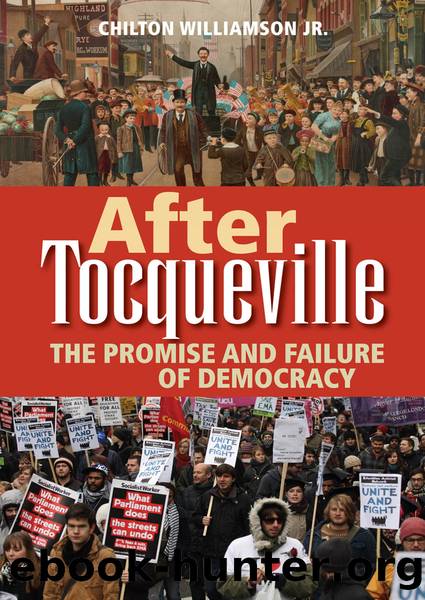After Tocqueville: The Promise and Failure of Democracy by Chilton Williamson

Author:Chilton Williamson [Williamson, Chilton]
Language: eng
Format: epub
Tags: Political Science, Political Ideologies, Democracy
ISBN: 9781610170222
Google: 8zWAZwEACAAJ
Goodreads: 13211526
Publisher: Intercollegiate Studies Institute
Published: 2012-01-15T06:16:08+00:00
9
Speechless Democracy
Before Marx, the human threat to civilization was called âthe mob.â Until about the time of the Great War, it was âthe massesâ; after the war, it became the âmass man.â Nietzsche, at the end of the nineteenth century, spoke of the mob but also of âthe last man,â whom he likened to a jumping flea: âThe time of the most despicable man is coming, he that is no longer able to despise himself.â
A generation later, Ortega y Gasset, a political liberal and antimonarchist who sat in the constituent assembly of the Spanish Second Republic in 1931â32, wrote a small but potent volume called The Revolt of the Masses deploring what Evelyn Waugh called âthe century of the common man,â whose lately acquired social, cultural, and political dominance Ortega viewed as a disaster for civilization. Democracy had become hyperdemocracy. The mass man is the product of a new world made possible by democracy, scientific experiment, and industrialism, abandoned to his own devices by the century that created him. The mass man is he who feels himself to be exactly like everybody else and takes pride in the fact; thinking he is perfect, the mass man has no aspirations and makes no demands on himself, while demanding everything.
The modern world itself is civilized, but it is inhabited by barbarians who are unable to keep pace with civilization and comprehend its challenges: âthe spoiled child[ren] of human historyâ who mistake the civilizing impulse for a force of nature that need not be summoned or harnessed. The rule of the mass man threatens the future of European civilization, and it has already deprived Europe of the historical sense of destiny on which its survival depends. By âmass man,â Ortega had in mind something beyond the modern proletarian: for him, the category included the specialized man of science, the barbarian updated for the modern world in which he plays a dominant role. âMan's fate,â Nietzsche had said, âknows no harsher misfortune than when those who have power on earth are not also the first men.â At the end of the twentieth century, Christopher Lasch wondered whether the principal enemy of the Western civilizing tradition really was the masses, or whether it might not be the ruling elite itself.
Western societies pride themselves on having largely erased class distinctions, and in a very real way they have done so. The Western publics are nearly identical with one another and, skin color excepted, largely homogeneous. They are what the classless society looks like, what socialism looks like, what mass society looks like. In the short run, that is a good thing for liberalism, but it is disastrous for democracy. The mass man is simply not the stuff from which a good democratic citizenâa person of sufficient character and independence who knows enough and thinks enough to play his proper part in the untiring effort to support and maintain democratic institutionsâis made. The mass man is fit for nothing but socialism; insofar as we are all socialists now, we are all mass men as well.
Download
This site does not store any files on its server. We only index and link to content provided by other sites. Please contact the content providers to delete copyright contents if any and email us, we'll remove relevant links or contents immediately.
| Anarchism | Communism & Socialism |
| Conservatism & Liberalism | Democracy |
| Fascism | Libertarianism |
| Nationalism | Radicalism |
| Utopian |
The Secret History by Donna Tartt(19088)
The Social Justice Warrior Handbook by Lisa De Pasquale(12190)
Thirteen Reasons Why by Jay Asher(8909)
This Is How You Lose Her by Junot Diaz(6887)
Weapons of Math Destruction by Cathy O'Neil(6280)
Zero to One by Peter Thiel(5802)
Beartown by Fredrik Backman(5754)
The Myth of the Strong Leader by Archie Brown(5507)
The Fire Next Time by James Baldwin(5445)
How Democracies Die by Steven Levitsky & Daniel Ziblatt(5218)
Promise Me, Dad by Joe Biden(5153)
Stone's Rules by Roger Stone(5088)
A Higher Loyalty: Truth, Lies, and Leadership by James Comey(4964)
100 Deadly Skills by Clint Emerson(4925)
Rise and Kill First by Ronen Bergman(4789)
Secrecy World by Jake Bernstein(4753)
The David Icke Guide to the Global Conspiracy (and how to end it) by David Icke(4719)
The Farm by Tom Rob Smith(4509)
The Doomsday Machine by Daniel Ellsberg(4490)
